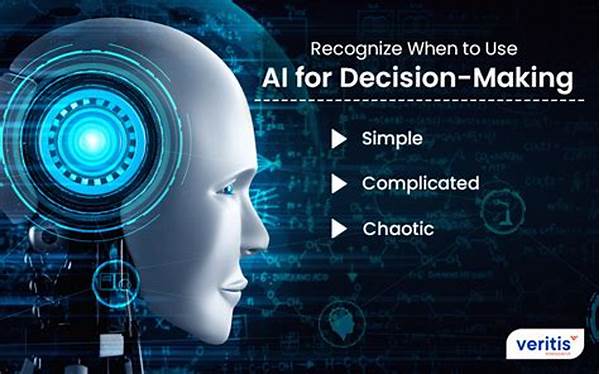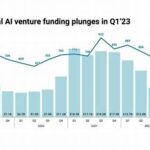In the ever-evolving corporate landscape, making smart, effective decisions is akin to striking gold. But let’s face it, we aren’t all King Midas. Enter Artificial Intelligence (AI), our modern-day genie, turning the daunting decision-making process into a streamlined task. How AI supports better decision making at work is not just a buzzword but a revolution, promising to not only unlock the doors of efficiency but also excellence.
Read More : Top Ai Assistants That Replace Virtual Pas
AI stands as the knight in shining armor, offering a plethora of unique selling points that transform decision making from cumbersome guesswork into a precise science. A recent study found that companies utilizing AI in decision making saw a 20% increase in productivity. This is no longer just science fiction; it’s a tangible advantage, bathing businesses in the warm glow of confidence and technical prowess. With AI crunching the numbers, identifying patterns, and showcasing forecasts, humans can focus on strategy and creativity. Let’s save the overthinking for choosing the perfect coffee blend, shall we?
The Role of AI in Streamlining Business Processes
Imagine AI as your workplace sidekick, doing the heavy lifting while you take the credit – it’s like having your cake and eating it too! AI tools, such as machine learning algorithms, can analyze gigantic datasets faster than you can say “double mocha frappuccino.” Through predictive analytics, AI can forecast market trends, consumer behaviors, and potential risks, acting as the compass guiding your business ship through the stormy seas of the market.
Your Next Step into AI Excellence
Still on the fence? Picture your workday: endless meetings, a backlog of emails, a to-do list that could rival Santa’s. Now, picture AI stepping in. It’s like upgrading from a tricycle to a Tesla. How AI supports better decision making at work becomes evident when decisions are no longer a heavy burden but a dynamic dance of data. Whether you’re a startup or a multinational, embrace a future brimming with AI-driven decisions – it’s more than an upgrade; it’s a paradigm shift.
AI in the workplace isn’t just an option, it’s an imperative in today’s fast-paced world. The goal isn’t just to keep up; it’s to lead, and AI makes that possible.
The Power of Predictive Analytics
In a world teeming with choices, being backed by data is your secret weapon. When it comes to making informed decisions, AI’s predictive analytics can wade through oceans of data and emerge with pearls of wisdom. With AI, businesses aren’t just reacting to the market – they’re predicting it. This ability to look into the proverbial crystal ball gives companies a significant competitive edge.
Real-Life Success Stories
Take, for instance, retail giants who have harnessed AI to anticipate purchasing trends. They efficiently manage stock levels, avoiding both the sting of overstock and the lost opportunities of stockouts. Another shining example is the healthcare sector, where AI predicts patient diagnoses, reducing human error and accelerating treatment plans. You see, how AI supports better decision making at work is not some future fairy tale; it’s our present reality.
How to Start Your AI Journey
The path forward is clear: businesses must integrate AI or risk being left in the dust. This isn’t about simply surviving; it’s about thriving. Identify the key areas where AI can enhance decision-making in your organization, and take small yet strategic steps to integrate AI solutions like chatbots, automated data entry, or machine learning in market analysis.
Fostering an AI-Friendly Work Culture
It’s crucial to foster an AI-friendly culture. Educate your employees on AI’s potential and encourage adaptation. Create a collaborative environment where humans and machines work as allies. How AI supports better decision making at work isn’t achievable in isolation; it’s a symbiotic relationship that requires mutual trust and a shared vision for growth.
- Implement AI-powered tools for data analysis and trend forecasting.
- Utilize AI in customer relationship management systems.
- Incorporate AI chatbots for improved customer service.
- Leverage AI in supply chain optimization.
- Adopt predictive analytics for risk management.
- Employ machine learning algorithms for personalized marketing.
- Train staff to work collaboratively with AI technologies.
The transformative power of AI is something businesses are increasingly capitalizing on. It’s not just about staying ahead of competition but also about redefining what’s possible. Imagine the Herculean task of sifting through mountains of customer data to tailor marketing efforts. AI performs this with the finesse of a maestro conducting an orchestra, turning potential chaos into a harmonious symphony of data-driven decisions.
How AI Makes Work More Efficient
The advantages of AI extend far beyond mere efficiency; they redefine it. The ability to glean deep insights from trillions of data points isn’t just preferable – it’s game-changing. When AI steps in to sort through complex spreadsheets and analyze patterns, employees are free to deploy their human ingenuity and creativity towards tasks that software might not handle, such as strategic planning and innovation development.
Building a Future-Proof Workforce
As businesses integrate AI, they also focus on fostering a future-proof workforce. Upskilling employees to work alongside AI technologies transforms how companies operate, ensuring adaptability in an environment that’s constantly evolving. This synergistic relationship between humans and AI isn’t merely supportive – it’s indispensable for future prosperity.
- AI enhances accuracy in decision-making processes.
- Predictive analytics helps in forecasting market changes.
- Data insights enable more informed strategic planning.
- AI-driven models improve risk assessment and management.
- Real-time data analysis optimizes operational efficiencies.
- AI aids in crafting personalized customer experiences.
- Adoption of AI is critical for maintaining a competitive edge.
- AI fosters innovation by facilitating creative problem-solving.
- Machine learning algorithms continuously refine decision-making.
- Robust AI integration future-proofs business models.
In the end, how AI supports better decision making at work is not solely a function of technology but a testament to human potential. As AI continues to evolve, so too will the ways in which we utilize it, creating a dynamic and robust ecosystem of innovation and progress. The journey is only just beginning, and the path forward is bright, paved with opportunities limited only by our imagination.


